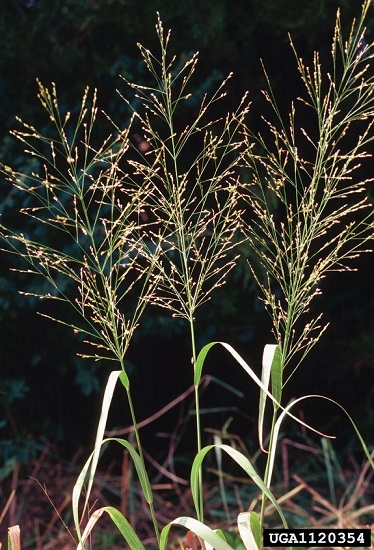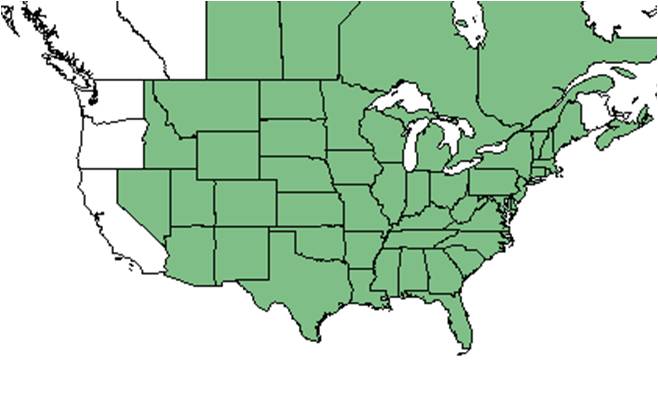Difference between revisions of "Panicum virgatum"
(→Taxonomic notes) |
(→Seed dispersal) |
||
| Line 36: | Line 36: | ||
It has been observed flowering in July and September.<ref>Nelson, G. [http://www.gilnelson.com/ PanFlora]: Plant data for the eastern United States with emphasis on the Southeastern Coastal Plains, Florida, and the Florida Panhandle. www.gilnelson.com/PanFlora/ Accessed: 12 DEC 2016</ref> | It has been observed flowering in July and September.<ref>Nelson, G. [http://www.gilnelson.com/ PanFlora]: Plant data for the eastern United States with emphasis on the Southeastern Coastal Plains, Florida, and the Florida Panhandle. www.gilnelson.com/PanFlora/ Accessed: 12 DEC 2016</ref> | ||
===Seed dispersal=== | ===Seed dispersal=== | ||
| − | This species | + | This species is thought to be dispersed by gravity. <ref>Kirkman, L. Katherine. Unpublished database of seed dispersal mode of plants found in Coastal Plain longleaf pine-grasslands of the Jones Ecological Research Center, Georgia.</ref> |
<!--===Seed bank and germination===--> | <!--===Seed bank and germination===--> | ||
<!--===Fire ecology===--> <!--Fire tolerance, fire dependence, adaptive fire responses--> | <!--===Fire ecology===--> <!--Fire tolerance, fire dependence, adaptive fire responses--> | ||
Revision as of 14:55, 4 September 2018
| Panicum virgatum | |
|---|---|

| |
| Photo by James H. Miller & Ted Bodner, Southern Weed Science Society, Bugwood.org | |
| Scientific classification | |
| Kingdom: | Plantae |
| Division: | Tracheophyta- Vascular plants |
| Class: | Lilianae - Monocotyledons |
| Order: | Poales |
| Family: | Poaceae |
| Genus: | Panicum |
| Species: | P. virgatum |
| Binomial name | |
| Panicum virgatum L. | |

| |
| Natural range of Panicum virgatum from USDA NRCS Plants Database. | |
Common names: Switchgrass; Old switch panicgrass
Contents
Taxonomic notes
Synonym: Panicum virgatum Linnaeus var. virgatum
Varieties: Panicum virgatum Linnaeus var. cubense Grisebach; Panicum virgatum Linnaeus var. spissum Linder
Description
"Spikelets usually in panicles, round or nearly so in cross section, 2-flowered, terminal fertile, basal sterile, neutral or staminate. First glume usually present, 2nd glume and sterile lemma similar; fertile lemma and palea indurate without hyaline margins. Taxonomically our most difficult and least understood genus of grasses, more than 100 species and varieties are ascribed to the Carolinas by some authors. Note general descriptions for species groups (e.g., 1-4, 5-8, 9-13, and 26-62)." [1]
"Elongate, rhizomatous perennial; culms 5-15 dm tall. Blades to 5 dm long, 1.5-8 mm wide, sparsely pilose above basally; sheaths occasionally pubescent, margins occasionally densely ciliate; ligules ciliate or lacerate, 1.5 mm long. Panicle open, 12-50 cm long, 6-20 cm broad. Spikelets 2.8-4.2 mm long. Frist glume 5-9 nerved, acute to keeled-cuspidate, 1.4-3.0 mm long, 2nd glume and sterile lemma 7-9 nerved, acute to cuspidate, 2.8-4.2 mm long, sterile palea2-2.6 mm long; fertile lemma 2-2.6 mm long. Grain grayish, 1-2 mm long." [1]
Distribution
Ecology
Phenology
It has been observed flowering in July and September.[2]
Seed dispersal
This species is thought to be dispersed by gravity. [3]
Conservation and management
Cultivation and restoration
Photo Gallery
References and notes
- ↑ 1.0 1.1 Radford, Albert E., Harry E. Ahles, and C. Ritchie Bell. Manual of the Vascular Flora of the Carolinas. 1964, 1968. The University of North Carolina Press. 145. Print.
- ↑ Nelson, G. PanFlora: Plant data for the eastern United States with emphasis on the Southeastern Coastal Plains, Florida, and the Florida Panhandle. www.gilnelson.com/PanFlora/ Accessed: 12 DEC 2016
- ↑ Kirkman, L. Katherine. Unpublished database of seed dispersal mode of plants found in Coastal Plain longleaf pine-grasslands of the Jones Ecological Research Center, Georgia.